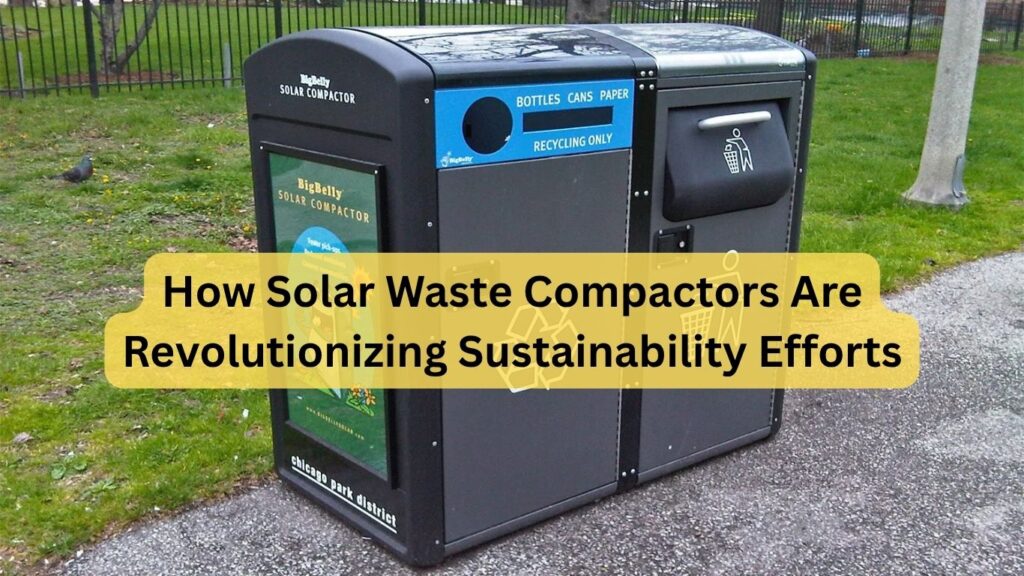In today’s world, where sustainability is a key focus, every industry is looking for innovative ways to minimize environmental impacts. Waste management, a crucial aspect of urban living, has long been a major challenge. With increasing urban populations and consumption rates, traditional waste management systems struggle to cope with the growing demand for efficient and eco-friendly solutions.
Enter the solar waste compactor – a game-changing solution that is revolutionizing the way we approach waste disposal and management, making it more sustainable, efficient, and cost-effective.
The Need for Sustainable Waste Management Solutions
Waste management systems have been under significant pressure as urban populations grow, and with it, the amount of waste produced. Traditional waste bins require frequent collection, often leading to inefficient operations and an increased carbon footprint. Furthermore, these systems are not designed to handle the evolving nature of urban waste, which includes more diverse materials, packaging, and waste types.
In addition, the environmental impact of waste disposal has become a global concern. Landfills are filling up faster than ever, creating long-term environmental hazards. Incineration plants, though sometimes considered a solution, emit harmful gases that contribute to air pollution. As a result, there has been a growing shift toward more sustainable and technology-driven solutions.
Enter Solar Waste Compactors: A Green Revolution
A solar waste compactor is an innovative and eco-friendly solution designed to optimize waste management in urban environments. Unlike traditional waste bins, which require frequent emptying, solar compactors use solar power to compress waste, reducing its volume by up to 80%. This means fewer trips are required to empty the bins, saving time, resources, and ultimately, reducing the carbon footprint associated with waste collection.
Solar waste compactors have been designed with solar panels that power the compaction mechanism, eliminating the need for external power sources. This is a significant advantage as it makes them suitable for installation in remote or off-grid areas, where access to electricity might be limited.
These devices are equipped with sensors that monitor the level of waste inside the bin and automatically compact the waste when it reaches a certain level. This automated process ensures that the compactor is only emptied when it is full, further optimizing waste management operations.
Key Features and Benefits of Solar Waste Compactors
1. Energy Efficiency and Sustainability
The primary benefit of solar waste compactors is their ability to operate using renewable energy. Solar power, being a clean and inexhaustible resource, drastically reduces the need for conventional power sources. This not only makes solar waste compactors an environmentally responsible choice but also lowers operational costs over time.
The use of solar energy eliminates the need for electric grids and external power sources, making these compactors perfect for areas without reliable electricity.
2. Cost-Effective Waste Management
Traditionally, waste management is expensive. The costs associated with waste collection, transportation, and landfill operations are high, both financially and environmentally. By reducing the number of pickups needed, solar waste compactors reduce fuel consumption, thereby decreasing transportation costs. Fewer pickups also lead to lower wear and tear on waste management vehicles, further decreasing maintenance costs.
Additionally, solar waste compactors require minimal maintenance, making them a more cost-effective option in the long run. Their long lifespan and efficiency contribute to a better return on investment for municipalities, businesses, and organizations implementing these systems.
3. Reduced Carbon Footprint
One of the most significant environmental benefits of solar waste compactors is their ability to reduce a city’s carbon footprint. By reducing the number of waste collection trips, the emissions associated with transporting waste to landfills are significantly minimized. Fewer trucks on the road mean less air pollution, which aligns with global goals to reduce greenhouse gas emissions and combat climate change.
4. Optimized Space Management
In densely populated areas, space is at a premium. Traditional waste bins take up valuable space on the streets, often leading to unsightly piles of trash. Solar waste compactors help optimize the use of public space by reducing the frequency of waste collection and increasing the storage capacity of each compactor. This means more waste can be stored in the same amount of space, improving the cleanliness and appearance of urban areas.
5. Enhanced Waste Monitoring
Solar waste compactors are equipped with advanced sensors that monitor the level of waste in the unit. This technology enables waste management teams to receive real-time data on when a compactor is full and needs to be emptied. This data-driven approach allows for more precise scheduling of waste collection, ensuring that resources are allocated efficiently and that the system operates optimally.
Conclusion
Solar waste compactors represent a breakthrough in waste management, providing a sustainable, cost-effective solution to one of the most pressing urban challenges. By harnessing the power of solar energy and utilizing smart technology, these devices help reduce waste volume, optimize waste collection, and improve environmental outcomes. The integration of solar waste compactors into urban infrastructure is an essential step toward creating smarter, greener, and more sustainable cities. As the demand for eco-friendly solutions continues to rise, solar waste compactors will undoubtedly play a crucial role in shaping the future of waste management worldwide.


